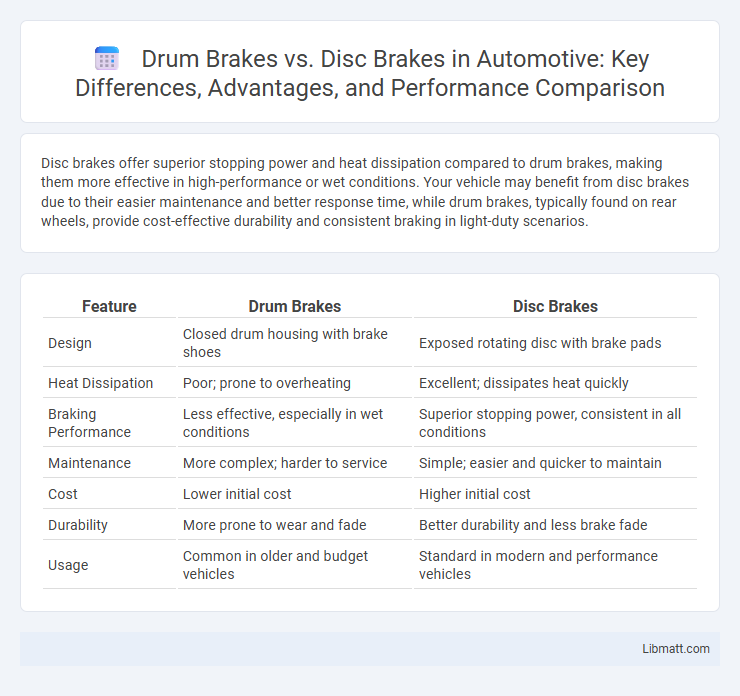Disc brakes offer superior stopping power and heat dissipation compared to drum brakes, making them more effective in high-performance or wet conditions. Your vehicle may benefit from disc brakes due to their easier maintenance and better response time, while drum brakes, typically found on rear wheels, provide cost-effective durability and consistent braking in light-duty scenarios.
Table of Comparison
| Feature | Drum Brakes | Disc Brakes |
|---|---|---|
| Design | Closed drum housing with brake shoes | Exposed rotating disc with brake pads |
| Heat Dissipation | Poor; prone to overheating | Excellent; dissipates heat quickly |
| Braking Performance | Less effective, especially in wet conditions | Superior stopping power, consistent in all conditions |
| Maintenance | More complex; harder to service | Simple; easier and quicker to maintain |
| Cost | Lower initial cost | Higher initial cost |
| Durability | More prone to wear and fade | Better durability and less brake fade |
| Usage | Common in older and budget vehicles | Standard in modern and performance vehicles |
Introduction to Drum Brakes and Disc Brakes
Drum brakes utilize brake shoes that press outward against a spinning drum attached to the wheel, creating friction to slow the vehicle. Disc brakes employ calipers that squeeze brake pads onto a rotating disc or rotor, providing more efficient heat dissipation and consistent braking performance. Both systems play crucial roles in automotive braking technology, with disc brakes commonly favored for their superior stopping power and resistance to fade.
How Drum Brakes Work
Drum brakes operate by pressing brake shoes outward against a spinning drum attached to the wheel, creating friction to slow or stop the vehicle. When you press the brake pedal, hydraulic fluid pushes the shoes apart inside the drum, converting kinetic energy into heat. This system is cost-effective and commonly found in rear braking setups but tends to have less stopping power and heat dissipation than disc brakes.
How Disc Brakes Operate
Disc brakes operate by using calipers to squeeze pairs of pads against a disc or rotor attached to the wheel, converting kinetic energy into thermal energy through friction. The hydraulic system pressurizes brake fluid, which activates pistons in the caliper to clamp the brake pads onto the spinning disc, providing precise and consistent stopping power. This mechanism allows for better heat dissipation and reduced brake fade compared to drum brakes, improving overall braking performance and safety.
Key Differences Between Drum and Disc Brakes
Drum brakes use a set of shoes that press outward against a rotating drum to create friction, while disc brakes utilize calipers to squeeze brake pads against a spinning disc, resulting in more efficient heat dissipation. Drum brakes tend to be less expensive and better suited for rear wheels due to their self-energizing effect, whereas disc brakes offer superior stopping power and performance under heavy braking conditions. Your choice between the two depends on factors like vehicle type, driving style, and maintenance preferences.
Performance and Stopping Power Comparison
Disc brakes provide superior stopping power and consistent performance under high temperatures due to better heat dissipation, making them ideal for high-speed and heavy-load applications. Drum brakes tend to fade more quickly during repeated braking because accumulated heat reduces friction efficiency, which affects performance on steep declines or in heavy traffic. Overall, disc brakes offer enhanced responsiveness and reliability, particularly in wet conditions, while drum brakes may still be effective for lighter, budget-friendly vehicles.
Durability and Maintenance Requirements
Disc brakes typically offer greater durability and require less frequent maintenance compared to drum brakes, thanks to their efficient heat dissipation and self-cleaning design. Drum brakes may wear faster under heavy use and often need regular adjustment and inspection to maintain optimal performance. Choosing disc brakes can reduce your overall maintenance efforts while enhancing reliability in demanding driving conditions.
Cost Analysis: Drum vs Disc Brakes
Drum brakes generally cost less than disc brakes due to simpler design and lower manufacturing expenses, making them a budget-friendly option for economy vehicles. Disc brakes, while more expensive initially, offer better performance, durability, and easier maintenance, which can reduce long-term costs by minimizing repair frequency. Cost analysis often favors drum brakes for upfront affordability but leans toward disc brakes for value in longevity and overall efficiency.
Safety Considerations for Each Brake Type
Drum brakes offer reliable performance in low-speed conditions but tend to overheat and fade during prolonged or heavy braking, compromising safety on steep descents or emergency stops. Disc brakes provide superior heat dissipation and consistent stopping power, making them safer in high-performance applications and wet conditions due to better water shedding. Proper maintenance of drum brakes is crucial to avoid reduced braking efficiency, whereas disc brakes benefit from easier inspection and faster wear replacement, enhancing overall safety management.
Applications: Where Each Brake Type Excels
Drum brakes excel in heavy-duty applications like trucks and buses due to their superior holding power and cost-effectiveness for large vehicles. Disc brakes perform better in passenger cars and high-performance motorcycles by offering superior heat dissipation and consistent stopping power under high-speed or wet conditions. Each brake type is optimized for specific driving demands, with drum brakes favored in load-bearing scenarios and disc brakes preferred for responsive and reliable braking performance.
Which Brake System Is Best for You?
Disc brakes provide superior stopping power and heat dissipation, making them ideal for high-performance vehicles and wet conditions, while drum brakes offer greater durability and cost-efficiency, which suits budget-friendly and heavy-load vehicles. The best brake system depends on your driving style, vehicle type, and maintenance preferences; disc brakes excel in responsiveness and safety, whereas drum brakes are favored for their longevity and simplicity. Evaluating the balance between performance needs and budget constraints helps determine whether disc or drum brakes are the optimal choice for your vehicle.
drum brakes vs disc brakes Infographic

 libmatt.com
libmatt.com